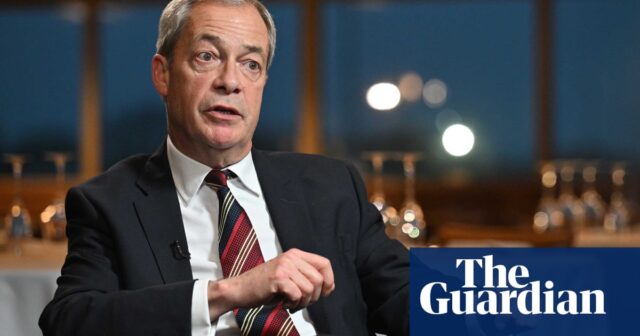Nigel Farage has refused to condemn Elon Musk for his comments about Keir Starmer and Jess Phillips, saying the prime minister in particular has questions to answer about failures to prosecute people over the rape of young girls.
The Reform UK leader said Musk the billionaire businessman and Donald Trump confidant, who has called Phillips a “rape genocide apologist” and Starmer “complicit in the rape of Britain”, had brought back free speech on social media since buying Twitter, which he renamed X.
“I don’t agree with everything he stands for,” Farage told BBC One’s Sunday With Laura Kuenssberg. “But I do believe in free speech. I think he’s a hero.”
He added: “Free speech is back. Well, you may find it offensive, but it’s a good thing, not a bad thing.”
Speaking later to the BBC, the health secretary, Wes Streeting, condemned Musk’s comments about Phillips, among a mass of messages on the subject of grooming gangs Musk has sent to his 210 million X followers in recent days.
“It is a disgraceful smear of a great woman who has spent her life supporting victims of the kind of violence that Elon Musk and others say that they’re against,” he said.
Farage, speaking after he addressed supporters at Reform’s East of England conference in Chelmsford on Saturday, described Musk’s language as “very, very tough terms”, but indicated it would only be seen as unacceptable if it was deemed to be inciting violence.
“You know, in public life, tough things get said,” he said. “Those on the left have thrown these sort of jabs at the right for many, many decades and will go on doing so.”
Farage said he believed Musk had justification in calling Starmer complicit in the failures to swiftly prosecute gangs who targeted vulnerable young girls in a series of UK towns and cities because of the prime minister’s role as director of public prosecutions before he became a politician.
“What he’s referring to, specifically, is that in 2008 Keir Starmer had just been appointed as director of public prosecutions, and there was a case brought before them of alleged mass rape of young girls that did not lead to a prosecution.
“I don’t know the rights and wrongs of that any more than you do, but if you believe in free speech, people are allowed to have an opinion.”
Farage said it was a valid question to ask whether Starmer “did, in effect, not prosecute a case for fear of what it would do to community relations”, not citing any evidence that this had happened.
Farage denied his disinclination to criticise Musk was connected to reports that Musk could donate as much as $100m (£80m) to Reform. While saying Musk “may well” donate, Farage dismissed the idea of a $100m gift.
A failure to distance himself from Musk’s increasingly frequent and inflammatory comments about British politics carries risks for Farage.
Polling shows Musk is personally unpopular with many UK voters, and a number of the issues he is commenting on, for example support for the far-right anti-Islam campaigner Tommy Robinson and the idea that the king should dissolve parliament and call an election, were not prominent beyond limited social media bubbles.
Musk’s interest in sexual exploitation in the UK follows reports that Phillips, the safeguarding minister, told Oldham council that it would be better for it to hold its own inquiry into local failure, rather than commissioning a national version.
Streeting defended this decision, telling Sky News there had already been a national inquiry on the subject, headed by the child welfare expert Alexis Jay. He said: “What I think not just historic victims, but victims today, tomorrow, next, next week, deserve is the full implementation of the Alexis Jay recommendations. Our predecessors didn’t implement one of them.”






